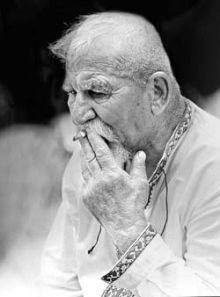These include Mykola Amosov, Stepan Bandera, Valerii Lobanovsky, Hryhorii Skovoroda, Lesia Ukrainka, Ivan Franko, Bohdan Khmelnytsky, Viacheslav Chornovil, Taras Shevchenko, and Yaroslav the Wise. Now we have to choose the greatest of them all — except it is unclear how one can choose between Taras Shevchenko, Hryhorii Skovoroda, and Yaroslav the Wise, and whether this is really necessary. What arguments can one come up with in claiming, for example, that Lesia Ukrainka is more famous than Stepan Bandera. Why not the other way around? It is clear that these formulas are essentially too straightforward and a priori erroneous. They are meant as a show and this explains their erroneous nature. Indeed the project “Great Ukrainians” is better than the one known as “A Chance.” Regrettably, the short features that were broadcast while announcing a hundred most famous names often reminded one of propaganda meant to assert the existing stereotypes rather than brief pieces of useful information. Perhaps full- length documentaries about each of the Top Ten, which the Inter Channel will start broadcasting every Tuesday, will correct this defect provided they are considerably more substantial and historically just.
Also, it would be interesting to carry out a similar project five or ten years from now. Perhaps we wouldn’t see Lenin’s name on the list. Or would we? The authors of the project pose a very correct question on http://www.greatukrainians.com.ua:
“Is Ukraine prepared to name its great [sons and daughters]? Most of the respondents (67.48%) believe that it is. Yet there are the other 32.52% who think that it isn’t.
As it is, the Ukrainian Top Ten include four politicians, three poets, a philosopher, a physician, and a soccer player/coach. Similar lists in other countries are dominated by political figures. Thus, Great Britain chose Sir Winston Churchill; Germany, the first Federal Chancellor of the FRG Konrad Adenauer; Canada, the outstanding politician Tommy Douglas; the United States, Ronald Reagan; Spain, King Juan Carlos de Borbon; Argentina, the South American revolutionary General Jose de San Martin... What does this mean? Hard to say. Is it publicity or the assumption that statesmen are more important than poets?







